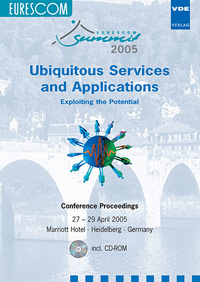Perceptual Interfaces and Distributed Agents supporting Ubiquitous Computing Services
Conference: EURESCOM Summit 2005 - Ubiquitous Services and Applications - Exploiting the Potential
04/27/2005 - 04/29/2005 at Heidelberg, Germany
Proceedings: EURESCOM Summit 2005 - Ubiquitous Services and Applications
Pages: 8Language: englishTyp: PDF
Personal VDE Members are entitled to a 10% discount on this title
Authors:
Soldatos, John; Polymenakos, Lazaros; Pnevmatikakis, Aristodemos; Talantzis, Fotis; Stamatis, Kostas; Carras, Michael (Athens Information Technology, Autonomic and Grid Computing Group, Peania, Attiki, 19002, Greece)
Abstract:
Ubiquitous computing constitutes a visionary yet constantly evolving computing paradigm, which is supported by a rich set of sensors, as well as a variety of middleware components. Sophisticated ubiquitous computing applications provide context-awareness through implicitly deriving information about the surrounding environment. Key to deriving context is the availability of perceptual components processing audio-visual streams. Perceptual components rely on computationally demanding processing of streams to provide context relating to people and objects. Additional middleware components are required to support acquisition and processing of composite context, which is a prerequisite to implementing ubiquitous computing services. In this paper we outline the key elements of ubiquitous computing services, emphasizing on the importance of perceptual processing for context-awareness. Accordingly, we briefly describe novel perceptual technologies, namely an audio source localization, a face detection, a face recognition and an eye detection system, along with their use in the scope of a prototype ubiquitous computing service. We also emphasize on the implementation of this service based on distributed agents, given that agent platforms facilitate the implementation of middleware components for pervasive and ubiquitous computing.


